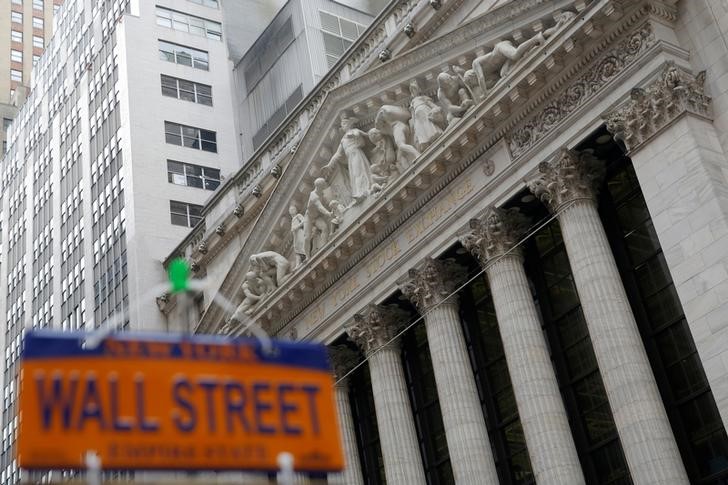Investing.com - The coming week marks the start of the fourth-quarter earnings season on Wall Street. Analysts expect earnings to be fairly strong, but are watching to see what companies say about the current quarter and the rest of the year, given expectations for a slower-growing economy.
Meanwhile, on the economic calendar, the latest report on U.S. producer prices, which should give clearer signs on the pace of inflation, will be the biggest data point of the week.
Reports on retail sales and housing starts, originally scheduled for this week, have been delayed because of the three-week-old partial government shutdown.
Global financial markets will also pay close attention to comments from a handful of Federal Reserve officials for additional insight into the outlook for monetary policy in the months ahead.
In Europe, the British parliament is due to hold a vote on Prime Ministers Theresa May’s Brexit deal on Tuesday after the first attempt at voting on the agreement was postponed last month.
Elsewhere, in Asia, China is slated to release what will be closely watched monthly trade figures. Investors will study the data to see if the ongoing trade conflict with the U.S. had any impact on exports and imports in December.
Ahead of the coming week, Investing.com has compiled a list of these and other significant events likely to affect the markets.
1. U.S. 4Q Earnings Season Kicks Off
The fourth-quarter earnings season on Wall Street will kick off in the coming week, starting Monday when Citigroup (NYSE:C) becomes the first of the major U.S. banks to release its quarterly results.
JPMorgan Chase (NYSE:JPM) and Wells Fargo (NYSE:WFC) are scheduled to report their earnings on Tuesday, followed by Bank of America (NYSE:BAC) and Goldman Sachs (NYSE:GS) on Wednesday and Morgan Stanley (NYSE:MS) on Thursday.
Other big names due to issue results include Netflix (NASDAQ:NFLX), UnitedHealth (NYSE:UNH), American Express (NYSE:AXP), Blackrock (NYSE:BLK), Delta Airlines (NYSE:DAL), and United Continental (NASDAQ:UAL).
2. U.S. PPI Data
The Bureau of Labor Statistics will publish December producer price inflation figures at 8:30AM ET (13:30GMT) Tuesday.
Producer prices are expected to have fallen 0.1% last month, according to estimates. If confirmed, it would be the first decline in four months.
Excluding the cost of food and fuel, core producer price inflation is projected to climb 0.2% from a month earlier and 2.9% on a year-over-year basis, a tad faster than the 2.7% increase registered in November.
Besides the PPI data, this week's rather light economic calendar also features a pair of surveys on manufacturing conditions in the Philadelphia and New York regions, as well as a preliminary reading of the University of Michigan's consumer sentiment index.
3. Fed Speakers
A number of Fed speeches will get market attention in the week ahead, as traders watch for further clues on interest rates.
Topping the agenda will be remarks from New York Federal Reserve President John Williams (NYSE:WMB), who will be speaking Friday about the economic outlook and monetary policy at the New Jersey Bankers Association's Economic Leadership Forum.
Speeches from Kansas City Fed President Esther George, Minneapolis Fed President Neel Kashkari, Dallas Fed President Robert Kaplan, Philadelphia Fed President Patrick Harker and Fed Governor Randal Quarles will also be in focus.
Fed Chair Jerome Powell said last week that the U.S. central bank's balance sheet will be reduced significantly from where it is now but also reiterated that policymakers were prepared to wait before hiking rates again.
4. Brexit Vote
Investors will keep a watchful eye on the British parliament's vote on Prime Minister Theresa May's deal for leaving the European Union on Tuesday.
It is widely expected that the vote will not pass as May struggles to secure the support she needs from lawmakers from her own party.
May has repeatedly insisted that her deal, which envisages continued close ties with the EU, is the only one on the table and that the alternatives are a painful 'no-deal' exit from the EU or possibly no Brexit at all.
Britain, the world's fifth largest economy, is scheduled to leave the EU on March 29.
Besides Brexit, market players will focus on monthly inflation figures as well as the latest retail sales report for further hints on the health of the economy.
5. China Trade Figures
China is to release December trade figures on Monday morning.
The report is expected to show that the country’s trade surplus widened to $51.5 billion last month from $44.7 billion.
Exports are forecast to have climbed 3.0% from a year earlier, slower than November's 5.4% increase, while imports are expected to rise 5.0%.
Recent data has started to show that China's economy may be losing steam, raising concerns about the potential fallout from the ongoing U.S.-China trade dispute.
The U.S. has slapped tariffs on more than half of over $500 billion in Chinese imports, for which China has retaliated, after several rounds of negotiations failed to resolve U.S. complaints over Chinese industrial policies and lack of market access in China.
-- Reuters contributed to this report
